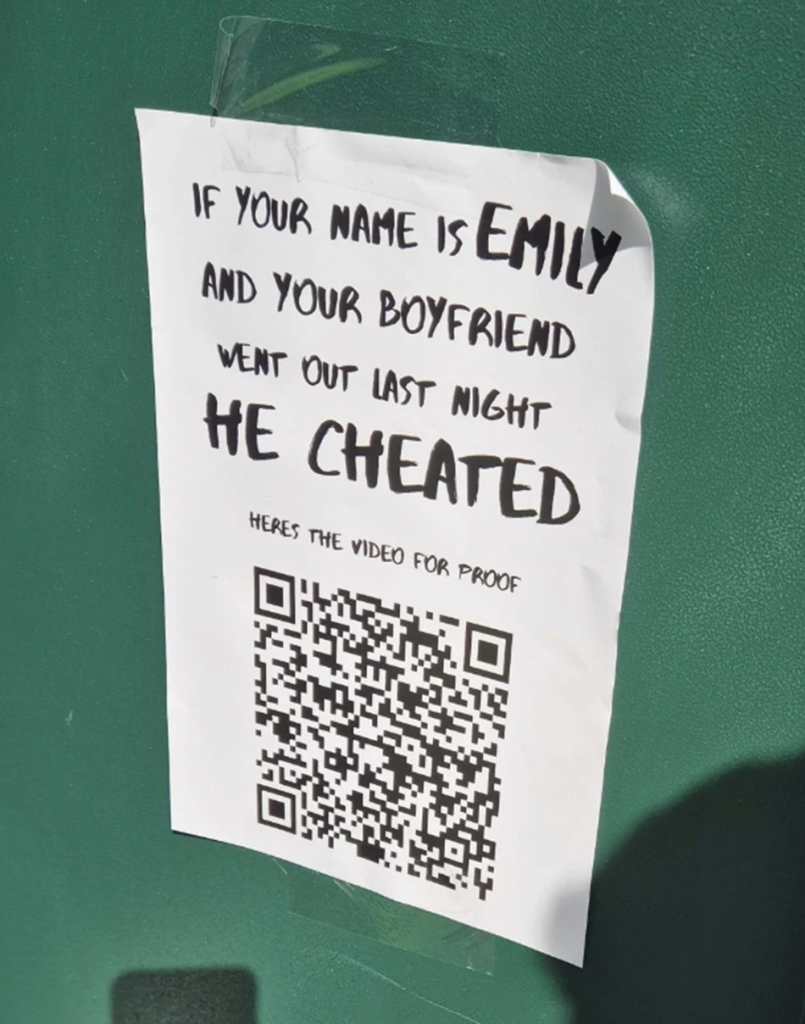Friend
Professional
- Messages
- 2,677
- Reaction score
- 1,096
- Points
- 113
What awaits the very Emily who decides to follow the link?
In the UK, mysterious posters with QR codes have appeared that read: "If your name is Emily and your boyfriend left last night, he cheated on you". One of these posters was seen in Manchester, where under the text there was a QR code offering to check what exactly happened, with the caption "here is video evidence".

This mysterious and provocative content instantly caught people's attention. It doesn't matter what the names of passers-by are - the name on the poster can be anything, but such messages inevitably arouse curiosity.
Posters instantly catch attention and generate anxious thoughts, forcing you to stop and take a closer look. The intrigue intensifies when a QR code is hidden under the call, beckoning to solve the mystery.
However, when scanning the QR code, the expectation of exposure is quickly replaced by disappointment, because the link leads to the Prograd website, an application for students to help them find a part-time job.
Such a marketing ploy automatically falls into the category of shock advertising and guerrilla marketing – non-standard, sometimes even provocative advertising campaigns aimed at attracting attention at any cost. Such tactics, while controversial, can be quite effective, especially if they target a younger audience.
Prograd representatives confirmed that the campaign started on September 17 and covered several major cities in the UK. They stressed that their goal was to help young people find opportunities for income and financial growth. The campaign has already shown excellent results in terms of the number of clicks to the site and the registration of new users.
Despite their apparent harmlessness, such QR codes can pose a potential threat. In different countries, there have been cases when attackers have used QR codes to distribute phishing sites and fraudulent applications.
So, last year, a woman from Singapore lost 20 thousand dollars after scanning a code that asked her to fill out a questionnaire in a café. Such schemes are becoming more and more common around the world. In this regard, experts urge people to be careful when scanning QR codes, especially in public places, as well as carefully check the links they are going to click.
Source
In the UK, mysterious posters with QR codes have appeared that read: "If your name is Emily and your boyfriend left last night, he cheated on you". One of these posters was seen in Manchester, where under the text there was a QR code offering to check what exactly happened, with the caption "here is video evidence".

This mysterious and provocative content instantly caught people's attention. It doesn't matter what the names of passers-by are - the name on the poster can be anything, but such messages inevitably arouse curiosity.
Posters instantly catch attention and generate anxious thoughts, forcing you to stop and take a closer look. The intrigue intensifies when a QR code is hidden under the call, beckoning to solve the mystery.
However, when scanning the QR code, the expectation of exposure is quickly replaced by disappointment, because the link leads to the Prograd website, an application for students to help them find a part-time job.
Such a marketing ploy automatically falls into the category of shock advertising and guerrilla marketing – non-standard, sometimes even provocative advertising campaigns aimed at attracting attention at any cost. Such tactics, while controversial, can be quite effective, especially if they target a younger audience.
Prograd representatives confirmed that the campaign started on September 17 and covered several major cities in the UK. They stressed that their goal was to help young people find opportunities for income and financial growth. The campaign has already shown excellent results in terms of the number of clicks to the site and the registration of new users.
Despite their apparent harmlessness, such QR codes can pose a potential threat. In different countries, there have been cases when attackers have used QR codes to distribute phishing sites and fraudulent applications.
So, last year, a woman from Singapore lost 20 thousand dollars after scanning a code that asked her to fill out a questionnaire in a café. Such schemes are becoming more and more common around the world. In this regard, experts urge people to be careful when scanning QR codes, especially in public places, as well as carefully check the links they are going to click.
Source

